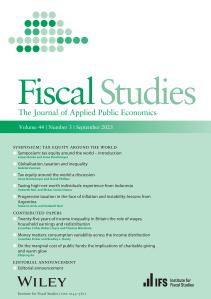It is probably creating large and unjustified distortions to how much people work, how much businesses invest, or to choices people and businesses make over how to allocate their time and resources. All those things make us less productive and leave us poorer. There’s a good chance the tax is also creating unfairness by giving different tax rates to very similar people.
Did you pick income tax or national insurance contributions? These are our biggest revenue raisers. Together, they bring in almost half of UK tax revenue. There are plenty of issues here, not least why we have two taxes on income in the first place. But the one that troubles me most is the tax penalty on employment. Employment income is taxed at higher rates than income people get from investments or from running their own business. It’s also taxed at higher rates than capital gains. This set up, often described as lower rates for the self-employed, but is not justified by differences in government benefits or employment rights and is not a well targeted way to boost entrepreneurship. Having different tax rates on different types of income adds a lot of complexity and is unfair in the sense that similar people can face drastically different tax bills depending on how they get their income.
If you picked VAT you might think you’ve picked a straightforward tax. It’s been described as “unquestionably the most successful fiscal innovation of the last half-century” and “perhaps the most economically efficient way in which countries can raise significant tax revenues”. It has certainly been popular with governments. It raises almost a fifth of UK tax revenue, double what it did when introduced 50 years ago. But the UK’s VAT is plagued with zero-rates and exemptions. These are expensive, representing £100 billion in foregone revenue annually, and create a huge compliance burden. Millions of valuable hours are spent applying and disputing these rules. And the rules don’t even make sense! A gingerbread man is zero rated for VAT as long as the chocolate decoration is ‘no more than a couple of dots for eyes’ – add a smile, and you’ll also need to add 20% VAT. Chocolate Nesquik – no VAT. Strawberry Nesquik – 20% VAT. And these are relatively straightforward examples. What madness is this? And what do we get in return? Zero-rating for goods such as food helps lower income households but in an extremely poorly targeted way. Equivalent support could be provided at much lower cost through the benefits system.
If you’ve picked a tax on housing, you’ve hit on a very troublesome part of the tax system. Council tax in England is based on property values from over 30 years ago. As such, the tax we pay bears increasingly little relation to the actual value of the property we live in. Council tax is also regressive. Not all parts of a progressive tax system need to be progressive; it’s the overall effect that matters. But it’s hard to justify lower tax rates for people living in more expensive homes. Council tax should be reformed. In contrast, stamp duty should simply be scrapped. It imposes a heavier tax charge on properties that change hands more often. There is no good reason to do this. It gums up the housing market meaning people find it harder to move to where the jobs are, young families struggle to trade up, and older people hold onto bigger properties than they need, because it costs so much to move.
The list goes on. Inheritance tax is easily avoided by the healthy, wealthy and well advised. Corporation tax discourages some profitable investments while subsidising some unprofitable ones. A jumble of environmental levies creates inconsistent incentives to reduce emissions, making it more expensive than necessary to reach net zero.
Most of these problems have been around for decades. People who had my job before I was born were writing about them. Depressingly, it’s likely my successors will say the same thing. But it’s not inevitable.
As the general election starts to come into focus, and political parties prepare for their autumn conferences, there will no doubt be debate about the overall level of taxation. UK tax revenues are historically high. Spending pressures will grow, most notably because an aging population will increase the cost of providing healthcare, social care and state pensions. Without tax rises or a major pick-up in growth, UK public service and benefits provision will either have to be scaled back or it will deteriorate. The level of tax needs serious debate.
But our living standards will be shaped not only by how much tax revenue is raised (and what it is spent on) but also by how it is raised. Taxes could be simpler, fairer and less damaging to our productivity. And if there is one thing that will make our choices over tax and spend easier, it’s productivity. Caring for an aging population, reaching net zero, improving public services or even cutting taxes, would all be easier if we were richer.
Missing that opportunity seems to me to be almost as silly as a tax that applies to marshmallows, unless they are intended to be roasted and eaten from a stick. There’s no shortage of choice on where to start reforming. Pick any tax.










